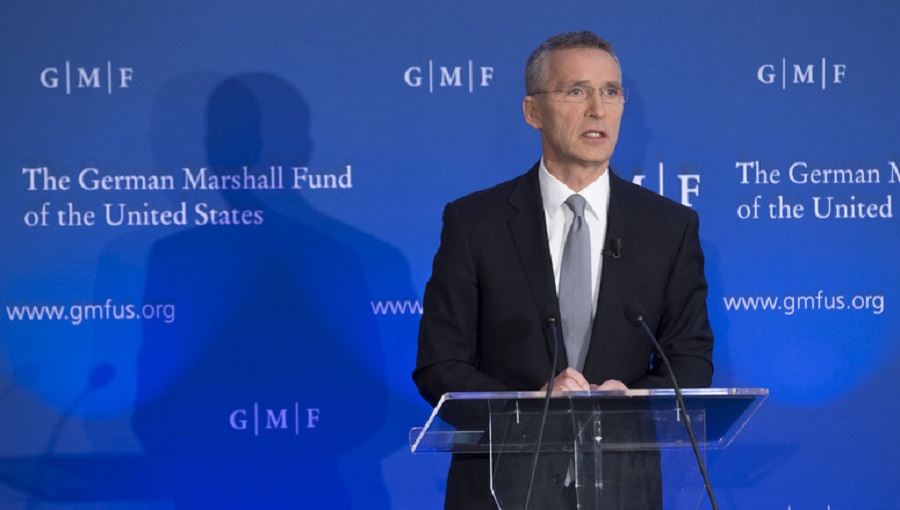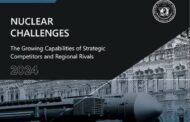A strong transatlantic bond in uncertain times
Speech by NATO Secretary General Jens Stoltenberg at an event hosted by the German Marshall Fund of the United States (GMF)
18 Nov. 2016
So Excellencies, ladies and gentlemen, first of all thank you for this very warm welcome.
And thank you to the German Marshall Fund and to Ian for hosting me and all of us today. The German Marshall Fund is a truly transatlantic organization and the German Marshall Fund is important for many reasons but especially because the German Marshall Fund is really contributing to strengthening the transatlantic bond and to build bridges across the Atlantic. And the GMF has been doing that for decades. And this is as important as ever in the uncertain times we are living in today.
I will give a speech and then afterwards I am happy to answer your questions and to take part in a dialogue with all of you. But let me start by just stating the following and that is that Europe needs America and America needs Europe.
So, this morning I want to talk about what binds us together. To explore the fundamental connection between the transatlantic bond and European security. And to outline what I believe we need to do to sustain that bond, and maintain that security.
Today marks exactly one hundred years since the final day of the Battle of the Somme. One of the bloodiest campaigns in the First World War. A battle in which over a million men were killed or wounded. On the eve of the First World War, British Foreign Secretary Sir Edward Grey had been sure that peace would prevail. That if war threatened, European nations would, in his words, “call a halt, and recoil from the abyss”. He was wrong. Like so many others.
The European powers could not call a halt. The result was utter destruction.
Two decades later, Europe was once again engulfed by war.
And the sons of those Americans and Canadians who had fought in Flanders Fields were asked to fight their way across the beaches of Normandy. But soon after the liberation of Europe, an Iron Curtain fell and divided the continent.
Two World Wars – and the Cold War – have taught us that the security of Europe relies on the United States. And that the United States has a profound strategic interest in a stable and secure Europe.
Today, the United States continues to demonstrate its commitment to Europe’s security. It will deploy a new armoured brigade to Europe. And deliver equipment and supplies to support future reinforcements, if needed.
And at the same time Europeans have always been there for Americans too. Since NATO was founded in 1949, America has had no more steadfast and reliable partner than Europe. Europe is America’s best friend.
NATO has been a unique force multiplier. A platform from which to project strategic interests. And for working seamlessly with Allies and partners around the globe.
So we have to remember that the only time when NATO has invoked our collective defence clause, Article 5, was in solidarity with the United States. As a direct response to the 9/11 attacks in 2001.
Since then hundreds of thousands of European troops have served in Afghanistan. Over a thousand have paid the ultimate price. And NATO continues to play a crucial role in the fight against international terrorism.
Every NATO Ally is part of the US-led coalition to counter ISIL. Drawing on decades of experience working together in NATO exercises and operations.
Our AWACS surveillance aircraft support coalition air operations.
NATO is training Iraqi officers to better fight ISIL. And we work with others throughout North Africa and the Middle East to help them improve their security.
Europe and the United States are close economic and trade partners. Together, they account for one third of world trade and half of global economic output.
A stronger, safer, and more prosperous Europe means a stronger, safer, more prosperous United States.
That is an essential lesson of twentieth century history. And we should not forget it.
Especially in uncertain times such as these.
Russia, breaking international law. Turmoil in North Africa and the Middle East. The refugee and migration crisis. International terrorism. Hybrid warfare. And cyber-attacks.
These are pressing challenges. Requiring unity and resolve. And a strong transatlantic bond.
To do that, we Europeans recognise that we have work to do.
Crucially, Europe must do more on defence and security.
And an important part of that is closer cooperation between NATO and the European Union.
I welcome ongoing efforts to strengthen European Defence. But we need to ensure it is done in a way which strengthens not weakens the transatlantic relationship.
For me, as Secretary General of NATO, there are three key points.
More money for better capabilities. Complementarity, not competition. And involvement of non-EU Allies.
First, some words about more money for better capabilities.
It is no secret that the United States has called for European Allies to spend more on defence. We have heard that call many times, from many American leaders. From President Obama and from President-elect Trump. From every senator and congressman I’ve met since becoming Secretary General.
And delivering on defence spending has been my top priority since the day I took office.
I raise this in every NATO capital I visit.
And I welcome the fact that Europeans are now stepping up.
At our Summit in Wales in 2014, all Allies made a pledge. To stop cuts in defence spending. And to gradually increase spending towards the goal of 2% of GDP within a decade.
Last year, for the first time in many years, we stopped the cuts across Europe and Canada.
This year, I expect a 3% real increase in defence spending in Europe and Canada.
But other than the US, only four NATO Allies currently spend 2% of GDP on defence.
If all Allies did, that would mean an extra hundred billion dollars. A one hundred billion dollar boost to our capabilities.
That’s roughly equivalent to the combined budgets of the largest defence spenders in Europe: the UK and France. Every year.
So we still have a long way to go. But we are heading in the right direction.
This week, the EU also took steps in the right direction.
Agreeing on measures to implement the Global Strategy in the area of security and defence.
They should lead to more efficient spending and better defence capabilities.
One issue we need to address better is the fragmentation of the European defence industry.
Let me give you some examples.
The United States has one type of infantry fighting vehicle. In Europe, we have 19. The United States has three types of air to air missiles. In Europe, we have 13 different types. The United States uses 4 different types of naval frigates. In Europe, we have 29.
Think what that means for our ability to work together and fight together.
And the unnecessary costs involved. So, we need to spend more and we also need to spend better.
That leads me to my second point: complementarity, not competition.
NATO nations and EU members simply cannot afford two sets of forces and capabilities.
We share 22 members – so to duplicate would be like competing with ourselves.
I know that when it comes to European Defence, a number of proposals have been put on the table. And that debate continues.
I took part in this discussion when I attended the recent EU Defence Ministers meeting in Bratislava, and again this week in Brussels.
It was clearly stated that there is no intention to create a European Army; or establish a military headquarters similar to that of NATO’s SHAPE. And it was also made clear that NATO remains the foundation for the collective defence of those countries that are part of the Alliance.
So at least some of the ghosts of the past appear to have been laid to rest.
To make sure that remains the case, we must have full transparency and the involvement of non-EU NATO Allies. That is my third point.
Allies such as the United States and Canada to the West; Iceland and Norway to the North; And Turkey and Albania to the South-East, are not members of the EU. But, together, they are essential for European security and will continue to be.
After Brexit, non-EU Allies will account for 80% of NATO’s defence spending. Three of the four NATO battlegroups to be deployed in Poland and the Baltic States will be led by non-EU Allies. So, we cannot afford to decouple European Defence from non-EU NATO Allies.
They all have an important stake in European security. And we must continue to acknowledge that. One way of doing so is by developing stronger NATO-EU cooperation. This will also reinforce the transatlantic bond.
The Joint Declaration that I signed together with Presidents Tusk and Juncker in Warsaw in July raised our cooperation to a new level.
Both organisations face security challenges of a new depth and complexity. And neither has the tools to overcome those challenges alone.
NATO has a unique set of experience, expertise and capabilities. A tried and tested command structure.
Key enablers such as AWACS surveillance planes. And high-end fighting capabilities. Our ability to do both collective defence and crisis management complements perfectly the wide range of capabilities the EU has to offer.
Together, we can be a formidable force for good.
Our combined efforts in the Aegean have been a major step forward. Helping to cut the lines of illegal migration.
Last week, we launched the maritime security Operation Sea Guardian.
With ships, submarines and maritime patrol aircraft operating in the Central Mediterranean.
Which will also be used to support the EU’s Operation Sophia. NATO and EU cyber defence teams already participate together in exercises. And have agreed to exchange information about threats, and share best practices.
We are working to implement the joint statement we made in Warsaw. And this is one the most important things when it comes to how to further strengthen the cooperation between NATO and EU and we are doing so with full respect for both organisations‘ distinct mandates, decision-making autonomy and institutional integrity.
Next month, High Representative Mogherini and I will present concrete proposals to further strengthen NATO-EU cooperation. In seven key areas: Countering hybrid threats, operations, cyber defence, defence capabilities, supporting the defence industry – on both sides of the Atlantic, exercises, and training and capacity building for our partners.
When NATO and the EU work together we can deliver real security. For our nations. And beyond.
Ladies and Gentlemen,
Exactly one hundred years after the final day of the battle of the Somme we must remember:
Peace and security in Europe cannot be taken for granted.
In these uncertain times we need strong American leadership.
And we need Europeans to shoulder their fair share of the burden.
But, above all, we need to recognise the value of the partnership between Europe and America.
A partnership on which we all rely.
And which we all need to nurture.
Because united we are stronger and we are safer. Thank you.
* * * * *
Zdroj textu a ilustračné foto: http://www.nato.int/cps/en/natohq/opinions_137727.htm?selectedLocale=en







